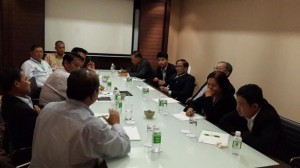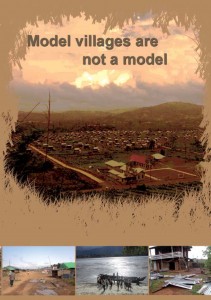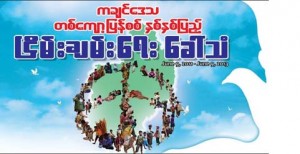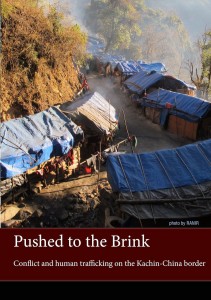Posts Tagged ‘Kachin State’ (265 found)
The Future Must be Federalism in Burma
 Preliminary peace talks between the alliance of ethnic non-state armed groups, the United Nationalities Federal Council (UNFC) and the Burma government in Chiang Mai, Thailand, over the weekend of 8-9 September resulted in little progress. Meanwhile the Burma Army is simultaneously reinforcing and strengthening its positions in Kachin State, resulting in more armed clashes and causing fear of another major offensive.
Preliminary peace talks between the alliance of ethnic non-state armed groups, the United Nationalities Federal Council (UNFC) and the Burma government in Chiang Mai, Thailand, over the weekend of 8-9 September resulted in little progress. Meanwhile the Burma Army is simultaneously reinforcing and strengthening its positions in Kachin State, resulting in more armed clashes and causing fear of another major offensive.
Led by Minister Aung Min, the Union Peace Working Committee invited the UNFC to Naypyidaw to sign a nationwide ceasefire accord despite there being no ceasefire agreement with the Kachin Independence Organization (KIO), a member of the UNFC. Given the increasing attacks on the Kachin and little tangible progress made in the peace process so far, the UNFC did not immediately accept the offer. The nationwide ceasefire accord signing is a major part of the government’s peace strategy and their plan is for international observers to be present, as well as domestic and international media. For the government, this very public show is important may be important to show the world that progress is being made, their peace plan is working and that perhaps more importantly, Burma is open for business […]
Burma Partnership to Launch Documentary Film: “Guns, Briefcases and Inequality: The Neglected War in Kachin State”
While President Thein Sein is being applauded internationally for his efforts to build peace in Burma, this new documentary film by Burma Partnership questions whether the government’s current process will really lead to sustainable peace and national reconciliation […]
• • •British Parliamentarians Call on Government to Prioritise Human Rights During Burmese President Thein Sein Visit
British Parliamentarians from the All-Party Parliamentary Group for Democracy in Burma are calling on Foreign Secretary William Hague to prioritise human rights when he meets Burmese President Thein Sein in London.
The All-Party Parliamentary Group For Democracy in Burma has recently heard evidence on a number of serious human rights issues, including the continuing recruitment of child soldiers, ethnic cleansing against the Rohingya, religious persecution against the Chin ethnic minority, and possible war crimes and crimes against humanity committed by the Burmese Army against Kachin civilians […]
• • •Kachin Organizations and Civil Society Groups Urge the United States Government to Renew the Burmese Freedom and Democracy Act
We, Kachin civilians and activists from 30 organizations are calling on President Obama, Speaker Boehner and Majority Leader Reid to renew the Burmese Freedom and Democracy Act, which will expire at the end of July 2013.
It is urgently needed to maintain pressure on the Burmese government to stop its policies of military aggression, and to begin a political dialogue to end the civil war in Burma […]
• • •Model Villages Are Not a Model
 This short report by Mungchying Rawt Jat (MRJ) documents cases of farmers who have been forcibly relocated to make way for “development” projects in Kachin State, and are now staying in Sanpya camp in Hugawng Valley, and Aung Myin Thar and Maliyang camps near the Irrawaddy Myitsone.
This short report by Mungchying Rawt Jat (MRJ) documents cases of farmers who have been forcibly relocated to make way for “development” projects in Kachin State, and are now staying in Sanpya camp in Hugawng Valley, and Aung Myin Thar and Maliyang camps near the Irrawaddy Myitsone.
Nobel Peace Laureates: A True Democratic Future in Burma Will Require Reconciliation
Burma has taken important steps in the past two years to move from decades of repression toward a democratic future. Many, though not all, political prisoners have been conditionally released. Our fellow Nobel Laureate Aung San Suu Kyi was freed from house arrest, and the National League for Democracy now has seats in parliament after contesting last year’s by-elections. The government has also taken some positive steps toward economic reform […]
• • •A Tentative Peace in Myanmar’s Kachin Conflict
On 30 May 2013, the Kachin Independence Organisation (KIO) signed a tentative peace agreement with the Myanmar government – the last of the eleven major ethnic armed groups to do so since 2011. This represents a major opportunity to secure lasting peace in Kachin State, and in the country as a whole. Yet, there will be significant challenges in doing so. Key issues still need to be discussed and agreed, including the repositioning of troops from both sides to reduce the chance of clashes, a monitoring mechanism, and a meaningful political dialogue. Major steps need to be taken to develop an equitable peace economy, and the exploitation of Kachin’s significant natural resources, if not appropriately regulated, could compound inequalities and trigger renewed conflict. Much remains to be done to avoid a repeat of the failures of the previous ceasefire process […]
• • •Statement of Ethnic People, Civil Society Organizations and Networks Calling for a Genuine and Just Peace
 On 9 June 2013, it will have been two full years since armed conflict between the Kachin Independence Organization (KIO) and Myanmar government resumed on 9 June 2011. During the last two years, more than 10 peace talks have taken place and we, the undersigned social networks and civil society organizations acknowledge and welcome the 7-point agreement signed in Myitkyina on 30 May as a step of improvement in terms of transparency […]
On 9 June 2013, it will have been two full years since armed conflict between the Kachin Independence Organization (KIO) and Myanmar government resumed on 9 June 2011. During the last two years, more than 10 peace talks have taken place and we, the undersigned social networks and civil society organizations acknowledge and welcome the 7-point agreement signed in Myitkyina on 30 May as a step of improvement in terms of transparency […]
Civil Society in Yangon to Mark 2nd Anniversary of Armed Conflict in Kachin State
On 9 June, 18 civil society organizations will commemorate the 2nd anniversary of renewed fighting between the Tatmadaw and the Kachin Independence Army (KIA) in Kachin State […]
• •Pushed to the Brink: Conflict and Human Trafficking on the Kachin-China Border
 On the surface, Burma seems to be strengthening its fight against human trafficking. Burma’s long-held position in the lowest ranking of international trafficking efforts finally inched upwards a rank as a result of several policy reforms and new programs. An anti-trafficking hotline opened, as did several anti-trafficking task force offices. Anti-trafficking stickers and posters are plastered in areas across the country, and American singer Jason Mraz recently teamed with MTV to hold a massive free concert in Rangoon to raise awareness about human trafficking
On the surface, Burma seems to be strengthening its fight against human trafficking. Burma’s long-held position in the lowest ranking of international trafficking efforts finally inched upwards a rank as a result of several policy reforms and new programs. An anti-trafficking hotline opened, as did several anti-trafficking task force offices. Anti-trafficking stickers and posters are plastered in areas across the country, and American singer Jason Mraz recently teamed with MTV to hold a massive free concert in Rangoon to raise awareness about human trafficking
The Kachin Women’s Association – Thailand’s earlier reports Driven Away (2005) and Eastward Bound (2008) had documented the growing incidence of trafficking along the China-Burma border. This new report looks at the impacts of the renewed conflict on this problem […]









 All posts
All posts